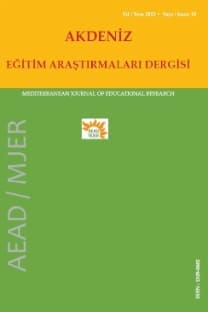Küresel Vatandaşlık Ölçeğinin Türkçeye Uyarlama Çalışması
Bu çalışmanın amacı küresel vatandaşlık düzeyini belirlemek amacıyla Morais ve Ogden tarafından 2010 yılında geliştirilen Küresel Vatandaşlık Ölçeğinin (Global Citizenship Scale –GCS) Türkçeye uyarlama, geçerlik ve güvenirlik çalışmasını yapmaktır. Ölçek beşli Likert tipinde puanlanan ve 3 alt boyuttan oluşan 30 maddeden oluşmaktadır. Araştırmanın çalışma grubu, Çanakkale Onsekiz Mart Üniversitesi Eğitim Fakültesi’nde öğrenim görmekte olan öğretmen adaylarıdır. Elde edilen veriler üzerinde ölçeğin geçerliğine ilişkin bilgi edinebilmek için yapılan açımlayıcı faktör analizi ve doğrulayıcı faktör analizi sonucunda orijinal ölçekteki yapıya oldukça benzer bir yapıya ulaşılmıştır. Açımlayıcı faktör analizi sonucunda ölçeğin Türkçe formunun toplam varyansın % 65,88’ini açıkladığı ortaya çıkmıştır. Ölçeğin güvenirlik analizi sonucunda Cronbach’s Alpha iç tutarlık katsayısı 0,86 olarak hesaplanmıştır. Elde edilen bulgular ölçeğin Türkçe formunun güvenilir ve geçerli bir ölçme aracı olduğunu göstermektedir.
Adapting Global Citizenship Scale to Turkish Language Abstract: The purpose of this study is to adopting global citizenship scale, originally developed by Morais and Ogden, to Turkish culture by conducting validity and reliability analysis. A five point Likert type scale was used to measure the responses to 30 declarative items. Candidate teachers studying in Faculty of Education at Çanakkale Onsekiz Mart University formed the study group. Exploratory factor analysis and confirmatory factor analysis carried out for validity analysis. The results revealed that Turkish form of the scale has very similar factor structure with the original scale. The 65.88 % of the total variance is explained by the Turkish version of the scale with a Cronbach’s Alpha coefficient of 0.86. In summary, results show that Turkish version of the scale has adequate validity and reliability.
___
Arnot, M. (2011). Global citizenship education and equality: Gendered hegemonies, tensions and a global gender ethic. K. Sporre, ve J. Mannberg içinde, Values, religions and rducation in changing societies (s. 51-65). Springer Netherlands.Braskamp, L., Braskamp, D., ve Merrill, K. (2008). Global perspective inventory (GPI): Its purpose, construction, potential uses, and psychometric characteristics. Chicago: Global Perspective Institute.
Büyüköztürk, Ş. (2007). Sosyal bilimler için veri analizi el kitabı. Ankara: Pegem Akademi Yayıncılık.
Cogan, J. J. (2000). Citizenship education for the 21. century: Setting the context. J. John, ve R. Derrıcot içinde, Citizenship for the 21. century: An international perspective on education. UK: Kogan Page Limited ve Usa-Stylus Publishing Inc.
Cole, D. A. (1987). Utility of confirmatory factor analysis in test validation research. Journal of consulting and clinical psychology, 1019-1031.
Cortina, J. M. (1993). What is coefficient alpha? An examination of theory and applications. Journal of applied psychology, 78(1), 98.
Deardorff, D. (2006). The identification and assessment of intercultural competence. Journal of Studies in International Education, 241-266.
Hair, J. F., Black, W. C., Babin, B. J., & Anderson, R. E. (2014). Multivariate Data Analysis - Seventh Edition. Edinburgh Gate: Pearson Education Limited.
Hunter, B., White, G., & Godbey, G. (2006). What does it mean to be globally competent? Journal of Studies in International Education, 267-285.
Ibrahim, T. (2005). Global Citizenship Education: Mainstreaming the Curriculum? Cambridge Journal of Education, 177-194.
Inbaraj, J., Kumar, S., Sambili, H., & Scott-Baumann, A. (2003). Women and Citizenship in Global Teacher Education: The Global-ITE Project. Gender and Development, 83-92.
Kan, Ç. (2009). Değişen Değerler ve Küresel Vatandaşlık Eğitimi. Kastamonu Eğitim Dergisi, 895-904.
Lagos, T. (2011). Global citizenship—Towards a definition. Ocak 11, 2011 tarihinde http://depts.washington.edu/gcp/pdf/globalcitizenship.pdf adresinden alındı
Martin, C. R., & Newell, R. J. (2004). Factor Structure of the Hospital Anxiety and Depression Scale in Individuals with Facial Disfigurement. Psychology Health and Medicine, 327-336.
Morais, D. B., & Odgen, A. C. (2010). Initial Development and Validation of the Global Citizenship Scale. Journal of Studies in International Education OnlineFirst.
Mundfrom, D. J., Shaw, D. G., & Ke, T. L. (2005). Minimum Sample Size Recommendations for Conducting Factor Analyses. International Journal of Testing, 5(2), 159-168.
Nussbaum, M. (2002). Patriotism and Cosmopolitanism. J. Cohen içinde, For Love of Country (s. 2-17). Boston: Beacon.
Oxfam. (2006). Şubat 11, 2011 tarihinde http://www.oxfam.org.uk/coolplanet/teachers/globciti/downloads/gcguide06.pdf adresinden alındı
Paige, M., Stallman, E., & Josić, J. (2008). Study abroad for global engagement: A preliminary report on the Study Abroad Global Engagement (SAGE) research project. Washington.
Schattle, H. (2009). Global Citizenship in Theory and Practice. R. Lewin içinde, The Handbook of Practice and Research in Study Abroad: Higher Education and the Quest for Global Citizenship (s. 3-18). New York: Routledge.
Sunal, C. S., & Haas, M. E. (2005). Social Studies For The Elemantary And Middle Grades. USA: Pearson Education.
Tabachnick, B. G., & Fidell, L. S. (2001). Using multivariate statistics (4th ed.). Needham, MA: Allyn & Bacon.
Ural, A., & Kılıç, İ. (2005). Bilimsel Araştırma Süreci ve SPSS ile Veri Analizi. Ankara: Detay Yayıncılık.
- ISSN: 1309-0682
- Yayın Aralığı: Yılda 4 Sayı
- Başlangıç: 2008
- Yayıncı: Tayfun Taşbilek
Sayıdaki Diğer Makaleler
Teknostres Kaynakları Ölçeğinin Türkçeye Uyarlama Çalışması
DERYA ORHAN GÖKSÜN, Halil İbrahim M. HASESKİ, ŞENAY OZAN LEYMUN
Türkiye'de Kimya Eğitimi Alanında Yapılan Lisansüstü Çalışmalar
Öğrencilerin İnternet Kısıtlamalarına Karşı Geliştirdikleri Yöntemlerin Belirlenmesi
Sınıf Öğretmenlerinin Süreç Temelli Yazmaya Yönelik Görüşlerinin İncelenmesi
MUAMBER YILMAZ, ÖMER FARUK KADAN
Mutlu UYGUR, TUğba YANPAR YELKEN
Küresel Vatandaşlık Ölçeğinin Türkçeye Uyarlama Çalışması
Öğretmen Adaylarının Çokkültürlü Eğitim ve Kimlik İşlevlerine İlişkin Algıları
OSMAN FERDA BEYTEKİN, Ayşegül PALTA
Örgütsel Erdemlilik ile Örgütsel Sağlık Arasındaki İlişkinin Öğretmen Algılarına göre İncelenmesi
